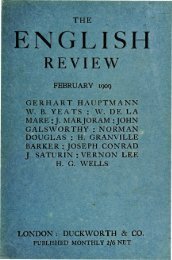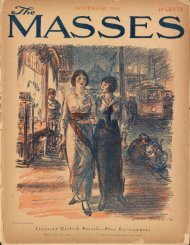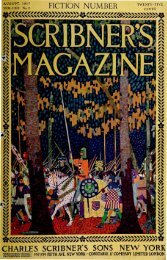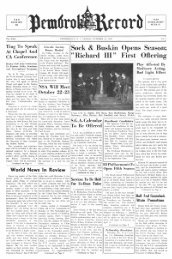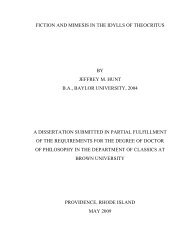View PDF - Brown Library
View PDF - Brown Library
View PDF - Brown Library
You also want an ePaper? Increase the reach of your titles
YUMPU automatically turns print PDFs into web optimized ePapers that Google loves.
The Motor in Warfare 195<br />
of any of the other armies in the field.<br />
Although a continental war had been quite<br />
unexpected in England, a large equipment<br />
of motor-ambulances was provided at the<br />
first outbreak, and urgent measures were<br />
taken to augment the supply from week to<br />
week. Not only were ambulances required,<br />
of course, at the front, but large<br />
"last word in comfort," and I know that<br />
many were not only specially built as regards<br />
the bodies, including six to the order<br />
of the American Women's War Relief Fund,<br />
but were attached to chassis of the most<br />
expensive type. A volunteer corps was<br />
also raised in England, pledged to work on<br />
the firing-line itself and rescue wounded<br />
From a photograph, copyright by Underwood & Underwood.<br />
Motor-'buses with the French army which were formerly used on the streets of Paris.<br />
numbers were provided for conveying British<br />
who might otherwise have been left to die<br />
and Belgian wounded to hospitals on upon the field of battle.<br />
arrival in England. When it was supposed<br />
It is impossible to speak too highly of<br />
that the service was complete, there<br />
came the news that the French troops were<br />
insufficiently supplied, despite the generous<br />
the invaluable work rendered by the motorambulances<br />
and the brave men and women<br />
of the Red Cross service, for never before<br />
help of the American community, and have they had to work under similar con<br />
further ambulances were despatched to ditions. There is overwhelming evidence<br />
Paris, to meet the pressing need of conveying<br />
of the fact that not only have the Ger<br />
wounded from the field-hospitals mans never scrupled to fire upon the<br />
to the more elaborate establishments in wounded, and upon doctors and nurses<br />
the French capital itself. Great suffering actually engaged in succor—a whole ambulance<br />
had been endured, meanwhile, by wounded<br />
men lying on the floors of vans, condemned<br />
to many weary hours of jolting in trains on<br />
company was blown to pieces<br />
while crossing the Aisne—but they have<br />
even abused the Red Cross to the extent<br />
congested lines; in fact, it was said that of arming their own ambulance corps, killing<br />
wounded men, and disguising officers<br />
the trains took from ten to twenty hours<br />
to do journeys which could be done in two as doctors with the object of obtaining<br />
or three by motor-cars. According to a access to the enemy's lines and carrying<br />
correspondent, however, of a Paris daily, back useful information to their own.<br />
the British ambulances represented the<br />
So far we have considered the forms



